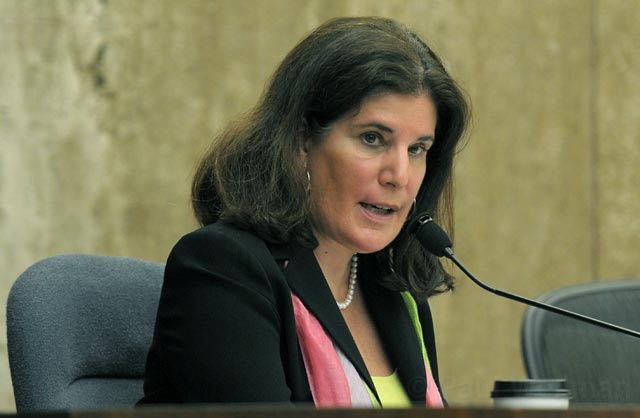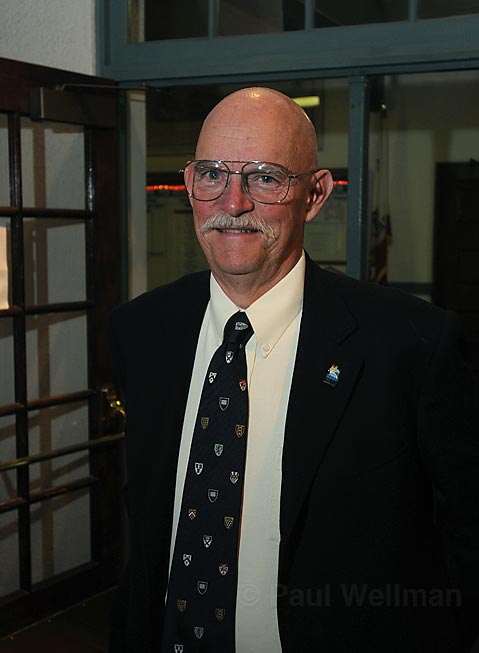Goleta Chamber Holds First Legislative Summit
State, County, and City Officials Discuss Regulations, Retirement Plans, and More
The Goleta Valley Chamber of Commerce held its first-ever legislative summit Thursday at the DoubleTree Resort, featuring a panel discussion addressing urgent issues facing the business community and California government.
The panel of elected officials included State Senator Tony Strickland, County Supervisor Janet Wolf, County Supervisor Doreen Farr, and Goleta Mayor Pro-Tem Ed Easton, sitting in for Mayor Margaret Connell. Hillary Blackerby also filled in for Assemblymember Das Williams. The inaugural event focused on three pressing issues facing state and local governments today: budgets, regulations, and unfunded liabilities. The conversation was moderated by Keith Woods, the senior advisor on chamber trends for the California Chamber of Commerce.

On the ever-present issue of raising revenue versus cutting spending in the state budget, Strickland attributes the increasing number of businesses fleeing the state to high taxes and inconsistent laws that change year-to-year. “You can’t raise taxes enough,” said Strickland. “By raising taxes you’re going to hurt the very economy that we’re trying to get people to foster and grow.” He suggests a transparent state checkbook, instituting a two-year budget, and eliminating unnecessary state boards and commissions, which he credits Governor Jerry Brown for cracking down on.
The County of Santa Barbara has already made spending cuts to tackle a $72 million deficit, particularly in staff reductions. Since she first joined the board in 2006, Wolf says the county has cut 4,300 employees down to 3,600, a tough “balancing act” that challenges them to make cuts without crippling the county’s ability to provide services to constituents.

When asked whether the Board of Supervisors is “overly environmentally concerned and not economically concerned enough,” both Farr and Wolf disagreed, saying the two are not mutually exclusive. “This county has a very strong environmental conscience. But … when I talk to you about property values, one could make the statement that they go hand-in-hand,” Wolf said. Farr connects laws pushing environmental preservation to the fact that Santa Barbara County was “one of few, if not the only” counties in the state with positive growth in property tax revenue, although not comparable to previous years. “We are really careful about land-use planning, we are very concerned … about sustainable practices. At the same time, we do want to grow our economy,” Farr added.

Shifting the discussion to regulation, there was a consensus among the panelists that less is more. “The single biggest barrier to doing business today, locally or in this state or even in this country, is what we perceive collectively to be over-regulation,” Woods said in framing the question. Blaming excessive state regulation for the exodus of companies leaving to do business in other states, Strickland called for the return of “red teams,” a term popularized under Governor Pete Wilson in the 1990s for committees that were tasked with persuading flighty companies to stay in the state. “The CEO of Carl’s Jr. told me that it takes him a couple months to get a new Carl’s Jr. built through the red tape in Texas, and … here, it takes about two years,” explained Strickland. “He hasn’t been building new stores in California for quite some time.”

In terms of getting a permit, Easton and the county supervisors all agree that it depends on what permit you’re trying to obtain. While the City of Goleta does have a fast-tracking process, the city is still developing means to process permits online. The county has used an advisory committee to streamline its process. “We had a group of representatives of government and development [that met] over a number of years to take the county’s permit planning department apart and really put it back together again,” Farr said. “After the terrible fires we had, we had a one-stop shop in the county so that people … didn’t have to go from one department to the next, and just get all the information and permits they needed right there.”
On the problem of unfunded liabilities, Strickland singled out an aging population and pension spiking as big problems for the state. “Too many times we have individuals who get a big increase in salary the last year,” Strickland said. Pension benefits are based on a percentage of the last year of work. Instead, he suggests the state use a “floating average.” But Blackerby says spiking is “fairly rare,” rejecting “the boogeyman of pensions taking down the state.”
Wolf agrees with Blackerby, but emphasizes “that it doesn’t negate the problem that the county has.” The unfunded liability for 2010 was 73.7 percent of what needs to be paid for all retirees. Part of the problem stems from issues Strickland pointed to: an aging population and an increase in salaries.
The county has moved to make some pension reforms, including elimination of a one-year final salary rate. With public safety contracts (more generous than any other public employee pension) set to expire in a few years, Farr says its retirement advisory commission is an important liason for the county to reach out to public safety to renegotiate a more workable contract.
For all this talk about reform, with pensions riding on good investments, Strickland says government needs to promote business in order to maximize the public benefit. “So what we can also do is make wise investments to make sure that we maximize those [pension] dollars,” Strickland said. “So you have to contribute more, you have to raise the retirement age, or you’ll have promises made that are not kept.”


